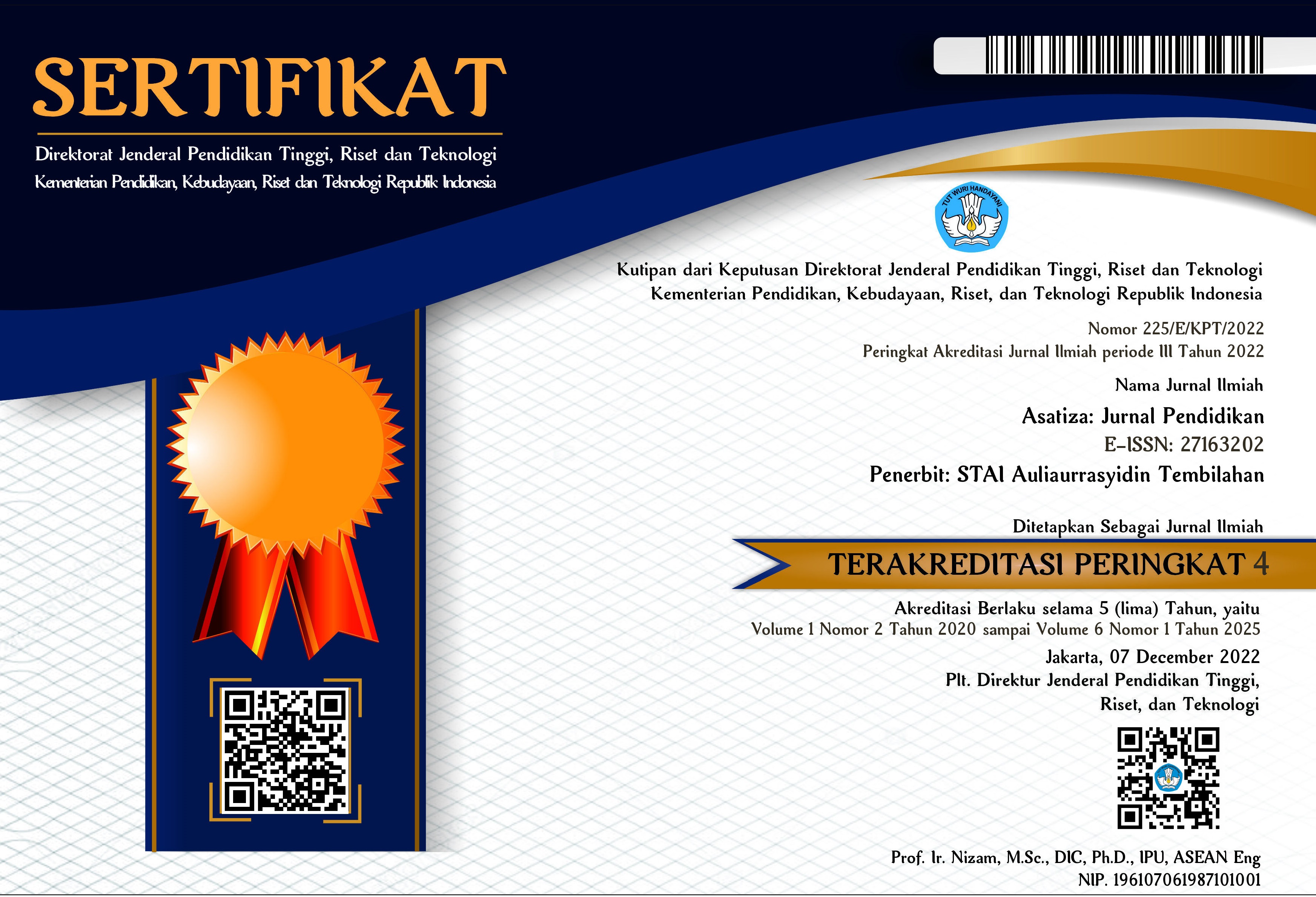The Miracles of Al-Quran: Al-Quran as a Grace and Guidance of Muslims
DOI:
https://doi.org/10.46963/asatiza.v2i2.299Keywords:
Grace and Guidance, Miracles, Al-Quran, MuslimsAbstract
This paper aimed at explaining the functions of the Al-Quran as a blessing and guidance for mankind, especially for Muslims in this world. It is the duty of the scholars at any time to find the existing arguments and process them with the right to provide legal certainty to problems that arise in time. To know the law of a problem based on the most appropriate arguments, it is necessary to update the right one, namely the Al-Quran because it has covered all problems in life. The result of this study showed that the Al-Quran is a light that appears in the hearts of Muslims, which breaks the flower of faith, appears in life so that it becomes light, rises to the heavens of mankind so that a plan of peace and guidance appears to humans to introduce their status and obligations, then lead to the straight path. This statement means that Al-Quran is guidance for humans. The function of Al-Quran globally is as a principle of the Islamic religion, in which there is the principle of every science in human language past and present and the future. Al-Quran is more than just a Holy Book, it is also a very useful book or a perfect reference.
Downloads
References
Anwar, E. (2009). Bahasa Al-Qur'an sebagai wahyu. Al-Fath, 3(1), 97-105. https://doi.org/10.32678/alfath.v3i1.3339
Hakim, R. (2014). Pembentukan karakter peserta didik melalui pendidikan berbasis Al-Quran. Jurnal Pendidikan karakter, 4(2).123-136. https://doi.org/10.21831/jpk.v0i2.2788
Hanafi, Y. (2012). Peningkatan kecerdasan anak melalui pemberian ASI dalam al-Qur’an. Mutawatir : Jurnal Keilmuan Tafsir Hadith, 2(1), 27–45. https://doi.org/10.15642/mutawatir.2012.2.1.27-45
Hidayat, R., & Wijaya, H. (2017). Ayat-Ayat Alquran Tentang Manajemen Pendidikan Islam. Jakarta: Lembaga Peduli Pengembangan Pendidikan Indonesia (LPPPI). Pg. 32.
Ikhwan, M. (2020). Legitimasi Islam: Sebuah pembacaan teoretis tentang wahyu Alquran. Mutawatir : Jurnal Keilmuan Tafsir Hadith, 10(1), 144–169. https://doi.org/10.15642/mutawatir.2020.10.1.144-169.
Kurniawati, E., & Bakhtiar, N. (2018). Manusia menurut konsep Al-Qur`an dan Sains. Journal of Natural Science and Integration, 1(1), 78-94. http://dx.doi.org/10.24014/jnsi.v1i1.5198
Latif, U. (2014). Al-quran sebagai sumber rahmat dan obat penawar (syifa’) bagi manusia. Jurnal Al-Bayan: Media Kajian dan Pengembangan Ilmu Dakwah, 20(2), 77-88. http://dx.doi.org/10.22373/albayan.v20i30.125
Muslih, H. (2014). Al-Quran Sebagai Sumber Ajaran Islam Yang Pertama. Bandung: Institute Technology Bandung.
Purwaningrum, S. (2015). Elaborasi ayat-ayat sains dalam al-quran: langkah menuju integrasi agama dan sains dalam pendidikan. INOVATIF: Jurnal Penelitian Pendidikan, Agama dan Kebudayaan, 1(1), 124-141.
Ridho, T. (1994). Fungsi Al Quran Dan As Sunah Sebgai Petunjuk Bagi Umat Manusia. Digital Library UIN Sunan Ampel.
Syaripudin, A. (2016). Al-Qur’an sebagai sumber agama Islam. NUKHBATUL ’ULUM: Jurnal Bidang Kajian Islam, 2(1), 132-139. https://doi.org/10.36701/nukhbah.v2i1.9
Thaib, E. J. (2014). Al-Quran Dan As-Sunnah Sebagai Sumber Inspirasi Etos Kerja Islami. Jurnal Dakwah Tabligh, 15(1), 1-9. https://doi.org/10.24252/jdt.v15i1.334
Downloads
Published
How to Cite
Issue
Section
License
Authors who publish with this journal agree to the following terms:
1. Copyright on any article is retained by the author(s).
2. The author grants the journal, right of first publication with the work simultaneously licensed under a Creative Commons Attribution shareAlike 4.0 International License that allows others to share the work with an acknowledgment of the work’s authorship and initial publication in this journal.
3. Authors are able to enter into separate, additional contractual arrangements for the non-exclusive distribution of the journal’s published version of the work (e.g., post it to an institutional repository or publish it in a book), with an acknowledgment of its initial publication in this journal.
4. Authors are permitted and encouraged to post their work online (e.g., in institutional repositories or on their website) prior to and during the submission process, as it can lead to productive exchanges, as well as earlier and greater citation of published work.
5. The article and any associated published material is distributed under the Creative Commons Attribution-ShareAlike 4.0 International License











2.png)



